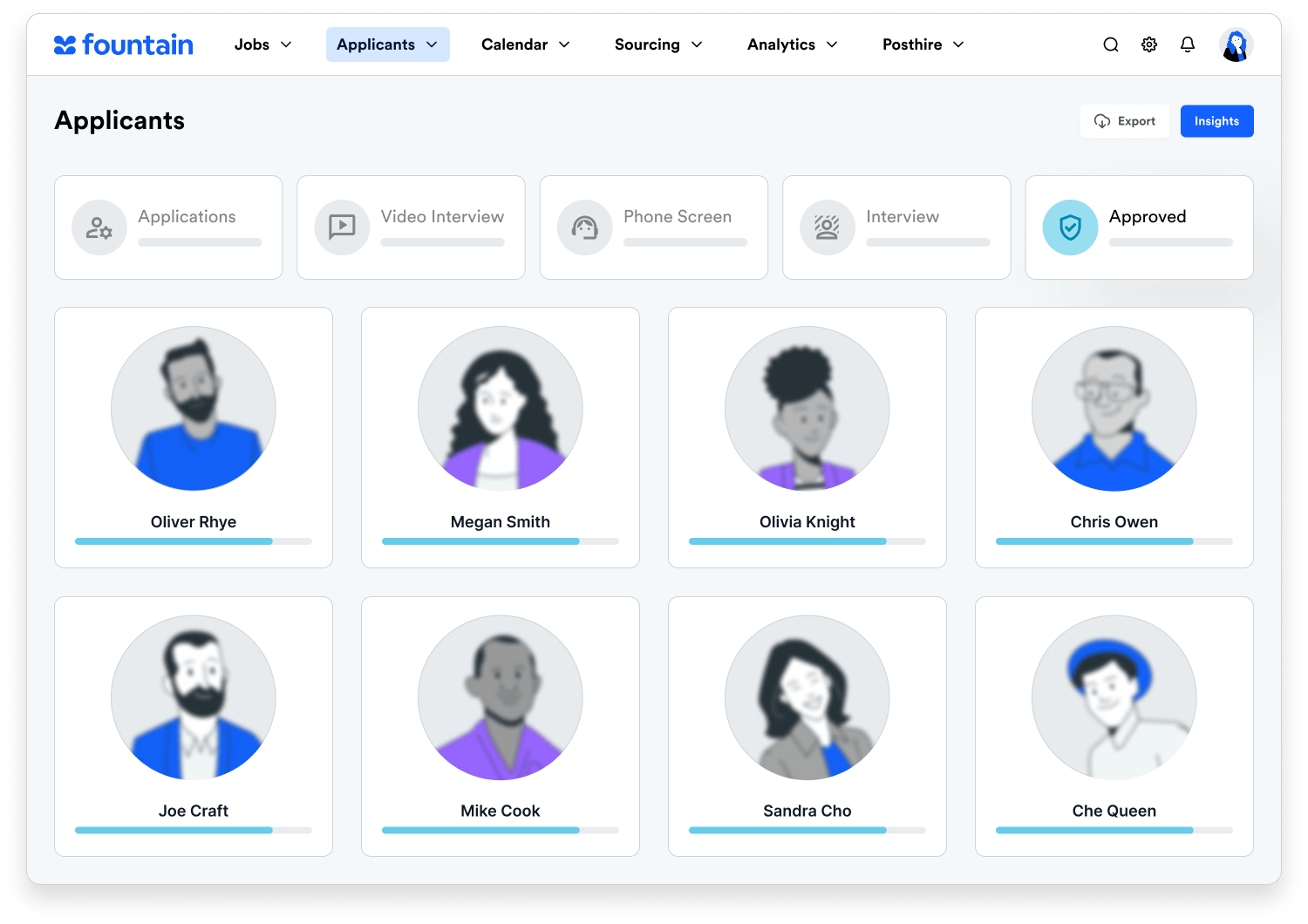As part of a new series called Fountain Voices, we’re tapping into the experience and expertise of our very own Fountaineers to get their takes on a variety of topics in the high volume recruitment space.
For our first edition, we spoke to Hope Weatherford, Senior Director of People at Fountain, about the rising shift toward skills-based hiring.
When was the last time you updated your resume? Chances are, it’s been a while. While resumes are still a necessary component for most corporate job applications, they’ve gradually been disappearing from hourly job applications in favor of a skills-based hiring approach.
Why?
Think about your hourly job applicants: It’s likely their job experience is varied and may include instances where skills were taught after they were hired. The recognition of this difference in experience has led to a shift in the way high volume hiring is conducted. Recruitment teams are on the lookout for adeptness at certain skills over educational or professional achievements, which means the application process for hourly workers looks a lot different.
To get more insight into this dramatic hiring shift, we sat down with Hope Weatherford, Senior Director of People at Fountain, to get her opinions on how skills-based hiring is shaping the future of frontline recruitment.
Why are companies switching to skills-based hiring?
Equity, longevity, and company success are the three main reasons organizations are moving toward a more skills-based hiring approach. Plus, by removing application roadblocks, recruiters can attract a more diverse set of candidates to open roles.
“Many companies are embracing skills-based hiring to make their recruitment process more fair and flexible,” Weatherford said. “By focusing on skills, businesses can identify the more appropriate candidates with the necessary know-how to drive innovation, productivity, and success within their team.”

Weatherford also notes that skills-based hiring can be more cost-effective and increase the likelihood that candidates will be better performers.
In the following sections, we’ll cover how skills-based hiring can lead to a more inclusive workplace, explore ways to implement skills-based hiring into traditional hiring practices, and offer tips for getting started with your own skills-based hiring strategy.
How does skills-based hiring contribute to a more diverse and inclusive workforce?
Presenting fewer job application requirements ultimately opens the door to a wider pool of candidates and fosters a fairer path to employment.
“The skills-based hiring approach is a great way to make sure everyone has a fair shot at getting the job,” Weatherford said. “It also can help bring in people with different abilities and experiences, which can lead to better problem-solving and decision-making.”
What’s more, a more diverse workforce “can improve how well an organization performs and how well it connects with customers,” creating a clear positive effect on a company’s bottom line.
How are organizations implementing skills-based hiring into their traditional hiring practices?
“This positive change is happening thanks to cutting-edge technology, including tools that assess skills, implement best practices for conducting job interviews, and focus on training the ideal candidate,” Weatherford said.
If applicants don’t have all the necessary skills required to succeed in a role but they display a strong willingness to learn and capability for adaptation, recruiters can feel confident moving them through the pipeline and focusing on training once they’re hired.
“When done right, skills-based hiring can create a workplace where everyone has an equal chance to succeed.” — Hope Weatherford, Senior Director of People at Fountain
Weatherford recalled such a time in her HR career when skills-based hiring worked in her favor:
“I interviewed someone who did not have the exact background that I was looking for, but had some of the skills that were required for success in the position,” she said. “We had two other top candidates who had the exact background, but in the final stages, I went with the person who had different experience, and I never regretted it. This person worked at the company for a number of years and continued to grow and positively influence the team and company.”
What changes can recruiters make to their hiring processes to focus more on skills?
To make your job openings more appealing and more accessible to a larger pool of candidates, we’ve rounded up some of Weatherford’s top tips to start building your own skills-based hiring plan.
Start with your job description
“Make sure your job description focuses on skills.” — Be clear and upfront about the skills required to succeed at the job, but also note that you’re open to training the right candidate who has the enthusiasm to learn and grow.
Weatherford also advises hiring teams to standardize these skills across all job openings to maintain consistency in hiring practices.

Integrate assessments throughout the hiring funnel
“Use tests to measure candidates’ skills.” — This can be done through ATS integrations like EduMe or Harver. Based on the results of these assessments, recruiters can get a better picture of candidates’ proclivities to learn on the job. Even if candidates don’t possess the necessary skills from day one, they might be teachable once hired.
Conduct interactive interviews
“Hold interviews that allow candidates to show off their skills.” — This might include exercises where the interviewer and the candidate act out real-life, on-the-job scenarios, enabling recruiters to see an applicant’s potential for the role.
Train your recruiters
“Providing training and guidelines on skills-based hiring can be really helpful for your recruitment team.” — This includes teaching recruiters the technological skills they’ll need to manage an applicant tracking system and use tools like artificial intelligence to screen candidates properly.
Learn more from our guide, AI for Applicant Engagement: How to Build Meaningful Conversations and Exceed Your Hiring Goals
Take stock of your hiring practices
“Regular programmatic updates from your HR/People teams can help create transparency and promote growth.” — Weatherford recommends setting up systems that allow you to collect feedback from your team and analyze hiring data to ensure your hiring process is working as it should.
Don’t forget about soft skills
“While skills are really important, you also need to think about whether the person will fit in with the team, whether they’re motivated, and other ‘soft skills’ that match your company’s values and goals.” — Candidates may not have every skill in their toolkit, but they can still show promise through proficiency in soft or “transferable” skills.
Read Beyond the Resume: How to Spot Transferable Skills Superstars
How to strike a balance with skills-based hiring
Despite the obvious benefits of shifting to a skills-based hiring approach to hiring hourly workers, there are a few drawbacks that need to be considered.
“You might inadvertently overlook someone with great formal education, or you might not see a candidate’s long-term potential,” Weatherford adds. “It can also be tricky to compare different skill sets.”
To solve these hangups, Weatherford urges hiring teams to address “any possible biases in skills evaluations to maintain a fair hiring process.”
Fostering diversity and inclusivity through skills-based hiring
Building an inclusive work environment starts by giving every applicant a fair chance to not only secure a job but also succeed in their role. Weatherford recommends providing inclusivity training for HR/People team members to help create a work culture that values diversity and inclusion.
“When done right, skills-based hiring can create a workplace where everyone has an equal chance to succeed.”

Hope Weatherford has been captivated by HR tech, from how it can change the way we work to how it can change the lives of others for the better. She has worked on People teams for all types of companies, from Fortune 100 to early-stage startups. She also serves as an advisor to multiple HR tech startups. Today, Hope leads the People Team at Fountain, who pride themselves on changing the world, one job at a time.

